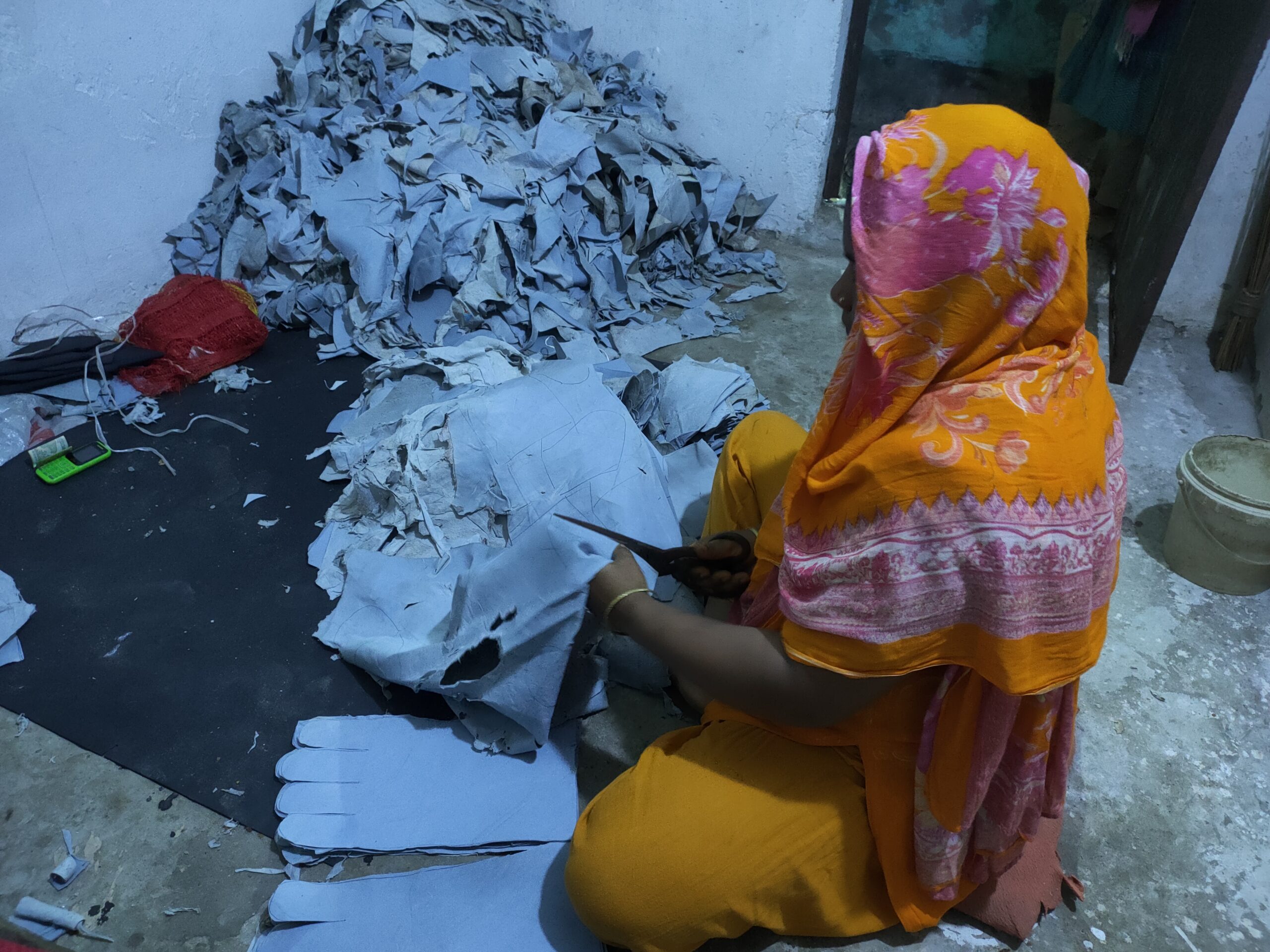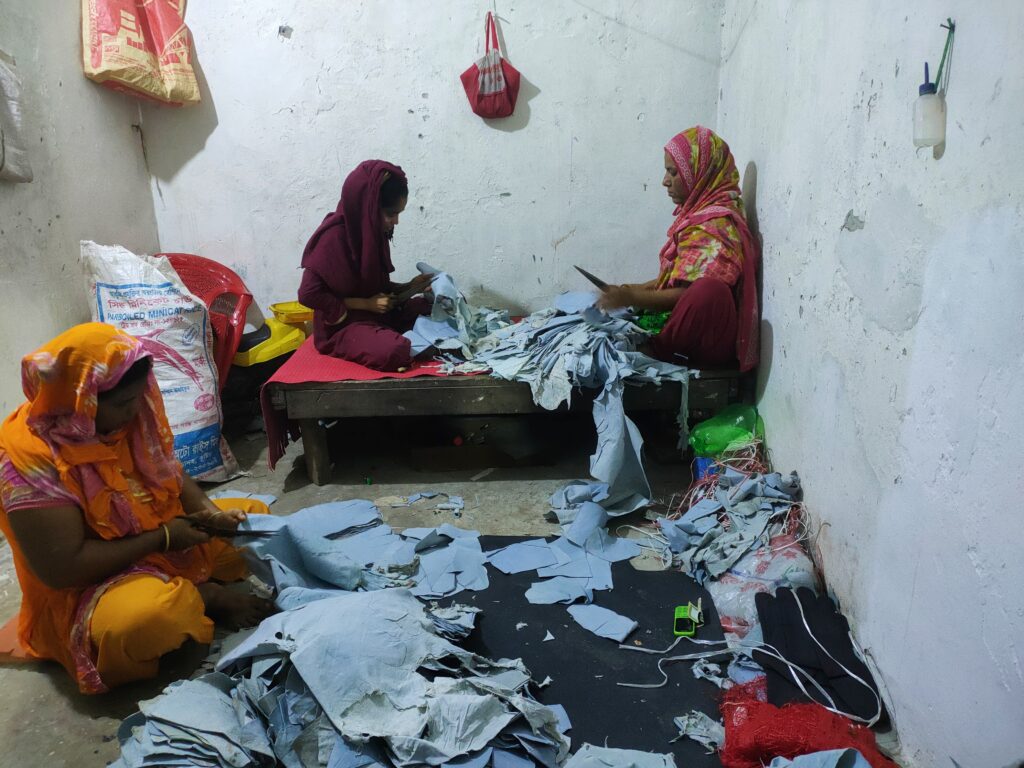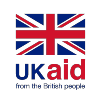The CLARISSA Social Protection (SP) intervention provided six months of unconditional cash transfers to every household in the Gojmohol neighbourhood, Dhaka. Recognizing the direct link between cash access and resilience for poverty alleviation, as well as its role in building agency and capacity, this initiative aimed to break the chains of hardship, particularly in the context of child labour. We anticipated that participation in the intervention would enhance people’s freedom to develop alternative livelihoods and households would be more able to withstand economic shocks. These changes ultimately served as a catalyst for enhancing child well-being.
Cash transfers work as an ignition to help people overcome obstacles such as low income and living costs in an urban informal setting. Here is a story of a household that received CLARISSA SP cash support and viewed it as an unexpected blessing to lessen their family’s economic hardships.
Morjina Begum (pseudonym), aged 30, has been residing in a lower-income neighbourhood in Dhaka with six members in her household for more than a decade. During this time, she had been employed as a leather hand glove cutter with a wage of BDT 6000 (£43) monthly. Her husband was a car driver, and they were leading a decent life. However, when the lockdown happened due to the Covid-19 pandemic, Morjina’s husband lost his job, disrupting their financial stability. Afterward, their elder son had to stop going to school due to the pandemic restrictions and the sudden financial shock experienced by the family. The family was burdened by debt after losing their regular income. When pandemic restrictions began to ease, to help the family, their 16-year-old son started working in a leather factory as a hand gloves cutter, the mother-in-law (65) started working as a housemaid, and Morjina had to bring her younger son (5) to her workplace because there was no one to look after him at home.

In December 2022, Morjina’s husband found a new job as a private car driver. At the same time, Morjina heard from the community mobilizer (CM) that the CLARISSA SP intervention would provide them with unconditional cash support for the next six months. After a two-year schooling gap, Morjina re-admitted her elder son to school in grade 6 with the first month’s cash support (BDT 3232/ £ 23). The challenges during the pandemic forced her son to get involved in work instead of studying, but he is thrilled to return to education. Her son shared his reflection with the CM:
“I am thrilled to be able to go back to school after a long gap with the school and education. When my schooling was stopped, I started working as a hand gloves cutter in a leather processing factory to financially support my family. Now I often help my mother’s leathering cutting business in my leisure time.”
Morjina shared the hardships that she faced during the pandemic, struggling with daily livelihood arrangements and the pressure of loan repayments. The unconditional cash support was an ignition that assisted her dreams to succeed at this challenging moment. Utilizing the CM’s continuous mental support and encouragement, her life took a transformative turn when she decided to utilize her 12 years of leather work experience to start her own business. She pictured repurposing leather waste to craft the inner layers of hand gloves. However, her desires had been put on hold due to the weight of debt and overdue rent. The unconditional cash support acted as a much-needed spark for starting her new business. She used her expertise and passion to craft something valuable from unused leather waste materials. This not only allowed her to take control of her life but also helped her overcome the economic hardships that had been holding her dreams back. The cash support from the CLARISSA Social Protection intervention, combined with her skills and aspirations, powered her business venture forward.
Initially, her investment was only BDT 4000 for this business. Gradually, her investment increased to 12000 BDT as she utilized the cash support to grow her business. She employed two workers from the neighbourhood to support her work. Her husband and children also provided mental support to boost her start-up. She expressed that her family members’ encouragement and the SP team’s mentoring support gave her the strength to establish herself as an entrepreneur. She has already started to contribute to her household’s daily expenses and her son’s educational costs. Her husband valued her opinion in the family-level decision-making process.

Morjina‘s aspirations do not stop at entrepreneurship. She wants to sew the inner layer of the hand gloves along with leather cutting to expand her business, and she is learning sewing machine operation to accomplish this. In addition to cash support, during her entrepreneurship journey, CM provided needs-based information, mentoring, and coaching support to reach her goal and establish herself as an empowered and resilient woman who could be able to address any shocks in her household and her life as well. Morjina reflected on her gratitude to the CLARISSA SP intervention:
“The best thing is that I can work independently and move independently now which I could not get when I worked at the leather factory. It’s a matter of freedom to me. It happened because of the unconditional cash support and mentoring support from Kashfi Apu (CM), and my husband’s cooperation. I am thankful to all of them for making it happen”.
Morjina’s ability to turn hard times into opportunity showcases her remarkable resilience and determination as well as the support she received from the CLARISSA SP intervention. Her son, who once worked alongside her, is now back in school, grateful for her efforts and the help of unconditional cash transfer support. This serves as a touching reminder that with the appropriate support and unwavering determination, individuals can overcome sudden shocks and change their lives.
